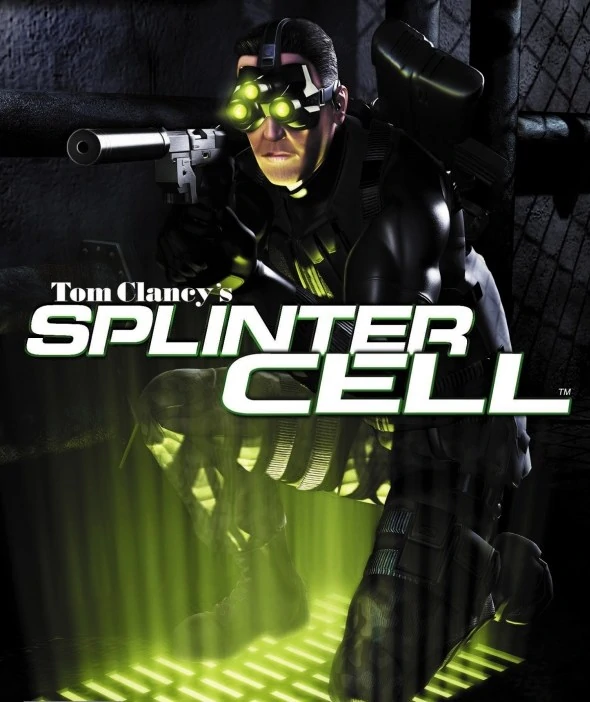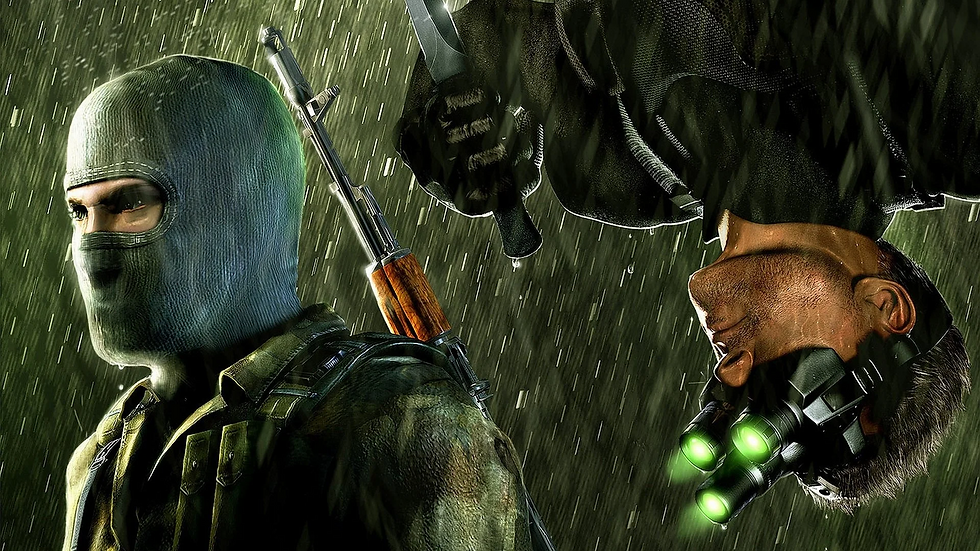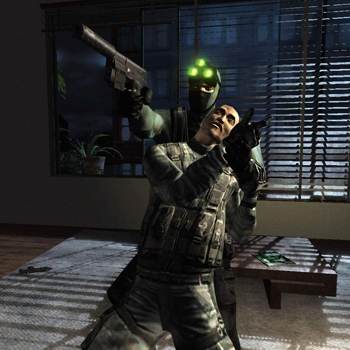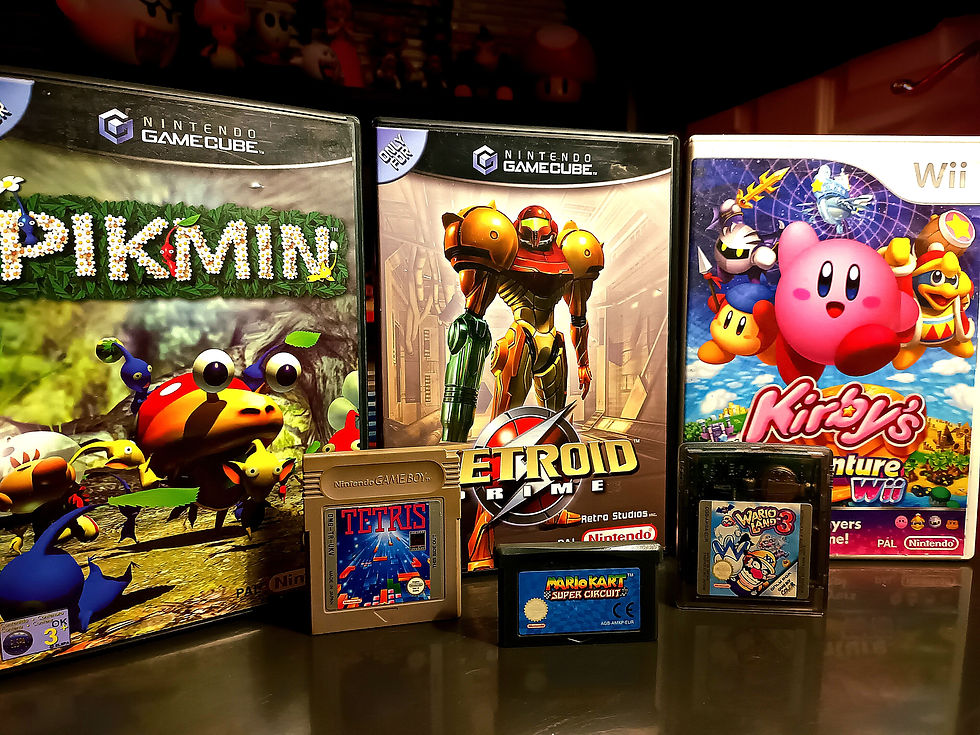Splinter Cell (2002) for Xbox, PlayStation 2, Gamecube
- Sam Cawley
- Oct 20, 2021
- 6 min read
A few weeks ago I reviewed Metal Gear Solid for PlayStation 1, my first venture into the Metal Gear series. The reason I didn't play Metal Gear prior to that or throughout my childhood, was because I was too busy playing a different kind of stealth game, Splinter Cell.

I've played every instalment of the Splinter Cell series and it's definitely one of my favourite series to revisit. The first one I played was actually the fourth game, Splinter Cell: Double Agent for the Nintendo Wii and that's where my love for the series started.
For this review I'm revisiting the original, which had a few different ports of varying graphical and gameplay quality. Due to this I'll be referring to the Xbox version, which is the best one to play if you're starting out.
History
The Splinter Cell series falls under the "Tom Clancy" banner of games, despite Tom Clancy having no involvement with it whatsoever.
Developer Ubisoft Montreal had some prior success with other Tom Clancy franchises, mainly Ghost Recon and Rainbow Six, themed heavily around military shooter gameplay. Following these they believed a special ops stealth game was the obvious next step.
What makes Splinter Cell (2002) standout is that the team working on it modified the engine the game was running on to allow for more light and darkness as well as making them distinct enough to be used during gameplay. This meant that the amount of darkness you were in was measured and used throughout the game, such as changing how easily you're spotted by enemies.
Overall the reception for the game was overwhelming positive, selling over 12.5 million copies by 2005.
Since it's initial release, the Splinter Cell series has grown into a huge and beloved Ubisoft franchise, seeing additional games, tie in and standalone novels, as well as an animated Netflix series which is currently in development. A film was also in the works at one point but hasn't really been mentioned for years.
Story
Meet Sam Fisher, protagonist of the Splinter Cell series.

An ex Navy Seal, Fisher is employed by his old friend Irving Lambert to join a new National Security Agency specialising in espionage, known as Third Echelon.
Two CIA agents have gone missing in Georgia and the country is close to declaring war. It's upto Fisher to infiltrate, find out all he can about the current situation and possibly avert a global disaster, without be caught. If word breaks out that an American agent has been discovered sneaking around, things would only escalate, which is why they need Sam.
Throughout the game you'll be sneaking through Georgian complexes, streets and rooftops late at night and even the CIA headquarters back in America, keeping things fresh the whole way through.
Gameplay
Focusing on stealth and strategy, Splinter Cell provides players with a wide variety of gameplay mechanics with a certain amount of freedom for how they complete their missions. Each mission takes place at a new location, with some being revisited later with a few changes.
The main mechanic is the stealth system. Fisher is an expert in sneaking around and with his arsenal of gadgets he's more than capable of getting a job done. Sight and sound are your two best friends and worse enemies at the same time. When making your way through areas full of patrolling guards, a light meter on your HUD (Heads up display) shows how visible you currently are.

When the bar is in the darkest spot, you're almost invisible, provided that you keep still. Guards will have a harder time spotting you depending on how dark your surrounding area is, meaning you have to stick to the shadows to ensure everything goes smoothly. Like I said though, your "almost" invisible, if a guard is very close to you, even in a dark spot, they might become suspicious of where your stood or more often than not, spot you straight away and gun you down.
On top of this, the noise you make is also something to consider. Footsteps make sounds, becoming louder the faster you're moving. The environment around you makes things more challenging, as the surface your walking on can make things sound louder, such as gravel or glass.
Stealth in Splinter Cell becomes a balancing act of managing your location, making sure you're somewhere hidden, and not making too much noise moving from one spot to another.
That's not to say Sam doesn't have a couple tricks up his sleeve to help him out from time to time. He's got a range of skills gadgets and weaponry to give himself the best environment to work in, and mastering his arsenal is essential for completing missions without a hitch.

For starters, Sam can interact with the environment around him. For example, he can shoot lights out to give himself more darkness to work in, at the cost of the loud shattering glass noise that will alert nearby guards, as well as create a louder surface to walk over. There are also objects on the floor like bottles that can be thrown to create distractions.
Gadgets are also pretty useful. These range from Taser rounds to quietly incapacitate people, sticky cameras that can be fired at walls for a different perspective of a room, a snake camera that can be used to see under doorways and the best of them all, goggles.

The night vision goggles are the most iconic part of the series, with the three green dots on the front becoming a logo for the series over time. These are what you'll be using the most as they let you see everything around you when your enemies cannot. They also come with a thermal vision mode which is handy for areas where your vision is obscured, such as a room full of smoke.
Combat isn't great but I feel like this was intentional. Your shots with a pistol or rifle can miss randomly unless you're incredibly close and when you're spotted there's really not a lot you can do to escape. This encourages you to take things slow and deters you from running and gunning which isn't what the game is about. Unfortunately there are sections of the game where you're forced into a shootout, which can lead to very frustrating moments as your accuracy is limited whereas their accuracy is practically pinpoint.

Overall gameplay is effective at putting you in the shoes of a secret agent without making you feel invulnerable. Replaying levels where you already know the layout of objectives and enemies can feel really rewarding especially if you finish it without being seen. Using up all your equipment too early can be a detriment later and every enemy you take down can come back to bite you as if you don't hide them somewhere out of view it alerts enemies in future areas, meaning they're more likely to spot you. It's a lot of fun and definitely where the game is strongest.
Audio
First I'll touch on the music as there's not a lot to talk about. The only time you'll really notice music is during cutscenes and whenever you're spotted during gameplay. One minute you'll be moving along in silence when all of a sudden bombastic and action packed music kicks in. It'll stop when you die or if you somehow manage to go into hiding.
The real beauty of the audio though is how it effects you in-game. Splinter Cell makes sure that every sound you hear is informative. This means It'll always be something that you need to hear. Footsteps for example, both from your own feet and patrolling guards give you a good sense of where to go and when. If a guard becomes suspicious of something a sudden audio cue will play letting you know they've seen something. Security cameras are present too, which are hard to spot unless you're looking for them but emit a low buzzing sound as they rotate. Every noise has a purpose in the gameplay which not only adds to immersion but gives the player a bit of help predicting what lies ahead.
It's also worth mentioning that the voice acting in this game/series is wonderful. The voice actor for Sam, Michael Ironside, does a brilliant job portraying a grizzled and cynical special ops agent. Sam is always cracking sarcastic comments and jokes and Ironside nails the delivery every time.
Conclusion
To finish off, Splinter Cell is an excellent example of a pure stealth game. Loud and dumb tactics are punished whereas clever and patient plans are rewarded.
The gadgets and skills that Sam uses are entertaining, useful, but balanced by being in limited quantity, making every decision count and adding to that player freedom of how they want to clear the level.
Ultimately it's a brilliant start to a beloved series, and following instalments only improve upon the foundation set by this one, giving you more choices, methods and more Sam Fisher, which is always a good thing.






Comments